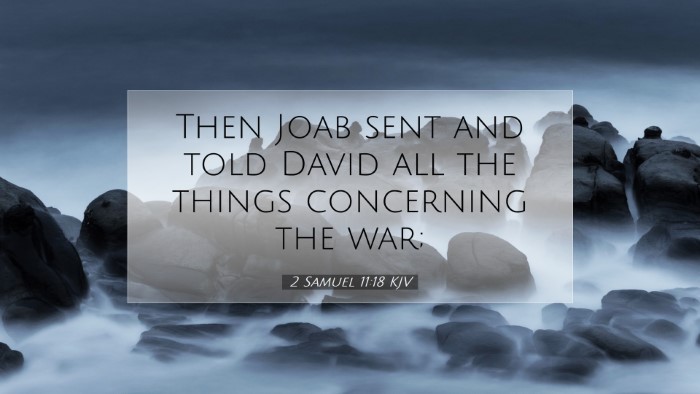Commentary on 2 Samuel 11:18
This verse forms part of the narrative surrounding the tragic events in King David's life, particularly relating to his moral failures and the repercussions that followed. It says:
"Then Joab sent and told David all the things concerning the war; and charged the messenger, saying, 'When you have finished telling the matters of the war to the king'" (2 Samuel 11:18, NKJV).
Contextual Overview
The chapter recounts a dark period in David's reign, where his adulterous relationship with Bathsheba led to grave consequences, including the orchestrated death of her husband, Uriah. The narrative is pivotal in understanding the complexities of David's character and leadership.
Insight from Matthew Henry
Matthew Henry, in his comprehensive commentary, emphasizes the gravity of David's actions. He notes that Joab's message was laden with implications that would weigh heavily on David's conscience. Henry highlights the necessity of accountability in leadership, illustrating how Joab, though loyal to David, was also embroiled in the moral decay instigated by David's sin.
- Sin's Consequences: Henry discusses how David's sin did not merely affect him; it reverberated through his kingdom.
- Leadership and Responsibility: He points out that leaders must face the effects of their choices, and David's failure here serves as a crucial warning.
Insights from Albert Barnes
Albert Barnes focuses on the role of messengers in the biblical narrative, illustrating how they act as crucial conduits of information. In this case, the messenger carries potentially distressing news to David, indicative of his involvement in a broader narrative of consequences.
- Divine Judgment: Barnes suggests that this communication mechanism underscores the idea that even in military success, moral failure leads to eventual downfall.
- Human Instrumentality: He asserts that God often uses human instruments to convey His will, which is evident in Joab's transmission of important news laden with moral weight.
Perspectives from Adam Clarke
Adam Clarke offers particularly detailed commentary regarding the political and relational dynamics within David's administration. He notes that Joab's role as commander makes his interaction with David significant.
- Joab's Position: Clarke illustrates Joab's dual loyalty—both to David and to the nation—suggesting that his report of the war's progress was tinged with the complexity of David's sins.
- Communication in Crisis: Clarke reflects on the nature of communication within leadership; Joab's careful charge to the messenger indicates a need for prudence and sensitivity in relaying troubling news.
Theological Reflections
This verse invites deeper theological reflection as it encapsulates the interplay between human actions and divine sovereignty. The act of sending a messenger can be seen as a metaphor for how God conveys His judgment and will through the events of life.
- Sin and Its Implications: The narrative leading to this point illustrates the extensive consequences of sin, reminding readers that actions have far-reaching effects.
- God's Sovereign Plan: Understanding how God can utilize even flawed individuals and situations to fulfill His purposes encourages believers to look for divine intervention in their lives.
Conclusion
In conclusion, 2 Samuel 11:18 encapsulates the profound implications of leadership failures, the weight of responsibility, and the seriousness of sin. The insights drawn from the commentaries of Matthew Henry, Albert Barnes, and Adam Clarke collectively highlight the necessity for introspection among leaders and the sobering reminder of the moral fabric that undergirds true governance.
As scholars and students of the Word study this passage, may they heed its lessons and strive for righteousness in their own lives.


